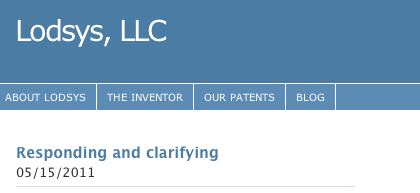Last Friday there was news that a number of independent developers for the iPhone and iPad had received legal warnings that they were violating patents that Lodsys owned. Suffice to say it sparked an outcry from developers, users and commentators; few had anything nice to say of Lodsys. Well today they have responded to a number of criticisms on their website in a series of Q&A posts. The key patent in question was that of Dan Abelow who sold his portfolio of patents to Lodsys back in 2004.
Its first response was in regards to the fairly frequented notion that Lodsys is a “parasite, troll, should die etc.”, they respond to this in saying that they are just like any other company who sells a product or service – they try to “get value for the assets it owns”. They write in the post “threats and irrationality don’t help. In particular, the death threats are seriously uncool.”
As for the question of the patents being “too broad”, Lodsys notes how easy it is too look back in hindsight, saying “of course this is how everyone is going to do it”. In response to patent licensing being unethical and similar questions, they say that it seeks an economic return to sell their patent assets, completely legal and furthermore citing the notion that patent licensing encourages future invention.
As for why they directly contacted developers and not Apple, they say it is because Apple (as well as Microsoft and Google) has already licensed the patents in question. They claim that they cannot provide the third party developers with the rights to the patent, and Apple hasn’t approached Lodsys for the purpose of attaining an eco-system-wide license for the patents. They say their goal is not to prevent developers from using the technology, rather that it is to popularize it and charge a relatively small license for it.
They claim in multiple areas that they specialise in efficiently selling rights to patents, they say that by having a consistent price model it also means independent developers aren’t unfairly disadvantaged.
As for how much developers will need to pay, Lodsys clarifies that the in-app purchasing mechanism for example would cost a developer 0.575% of their US revenue over the period the technology was implemented until the patent expires. It gives an example of an app that earns US$1 million in one year would pay US$5,750.
[Via TheNextWeb]
You can read all of Lodsys’ responses on their blog.


